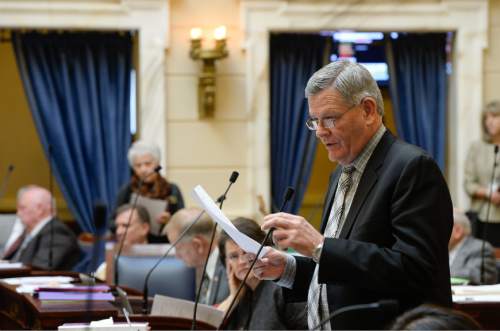This is an archived article that was published on sltrib.com in 2015, and information in the article may be outdated. It is provided only for personal research purposes and may not be reprinted.
Senators decided Tuesday that a deal is a deal.
They killed legislation seen as an attempt to renege on a compromise made last year with organizers of the Count My Vote ballot initiative.
Senators voted 19-9 to kill Senate Bill 43, which would have delayed until after the 2016 elections a new law that allows candidates to qualify for a primary election either by gathering signatures, or through the caucus-convention system.
Sen. Scott Jenkins, R-Plain City, sponsor of the bill, said the Republican Party needs more time to make changes to comply with the new law — or it might not appear on the ballot and its candidates might be forced to run as unaffiliated. He also sought the delay to allow a GOP lawsuit challenging the law to work through the courts.
Utah Republican Party Chairman James Evans sat behind Jenkins during the debate, and sent out a memo supporting his points and asserting that the party had never been part of last year's compromise.
Sen. Todd Weiler, R-Woods Cross, said that claim is not credible. Evans even attended the press conference that announced the compromise, he said, and the party had two years before the 2016 elections to implement changes.
The agreement struck last year prompted Count My Vote to throw away more than 100,000 signatures for its ballot initiative. GOP leaders are attempting "to come back one year later, and to say, 'Oops, we got you. We fooled you,' " Weiler said. " 'You threw away those signatures and now we are going to pull the carpet out from under you.' I think it lacks integrity."
Count My Vote would start gathering signatures again if the Legislature approved Jenkins' bill, Weiler warned. Utahns overwhelmingly approve of the compromise law — 73 percent to 20 percent — according to a newly released poll by Brigham Young University's Center for the Study of Elections and Democracy.
Sen. Curt Bramble, R-Provo, author of the compromise, called SB54, said having the new law in effect for the 2016 elections was always a key part of the deal. "To vote for delay would directly violate that agreement."
Bramble also contended the party does not need to change its bylaws to qualify for the ballot under the new law.
Weiler said the Legislature did what the party was unwilling or unable to do with SB54: find a way to preserve key parts of the caucus-convention system and not lose it to a direct primary that Count My Vote appeared well on the way towards forcing.
Jenkins said, "Many of you here [in the Senate] view yourselves as the Republican Party and you're not. … The Republican Party is the delegates, the people who meet together and decide what it is and where they are going to go."
After his bill's defeat, Jenkins postponed a scheduled final vote Tuesday on a separate constitutional amendment, SJR2, he is proposing. It would say that the state cannot interfere with how parties choose to select their nominees.
That measure would have to pass both houses of the Legislature by two-thirds majorities, and then win a majority among voters in the next general election. In a preliminary vote on Monday, that amendment fell three votes short of the required two-thirds in the Senate. Jenkins said he is working on new intent language to seek those votes.
Rich McKeown, executive co-chairman of Count My Vote said after the Senate's action that, "We are pleased that the Utah State Senate has voted to preserve the implementation date of SB54 which means that Utah voters will enjoy the addition of an open primary to our system of elections."
He added, " Count My Vote has confidence that the Legislature is acting, and in the future will act, consistent with the agreement to add an open primary in the 2016 election cycle."



